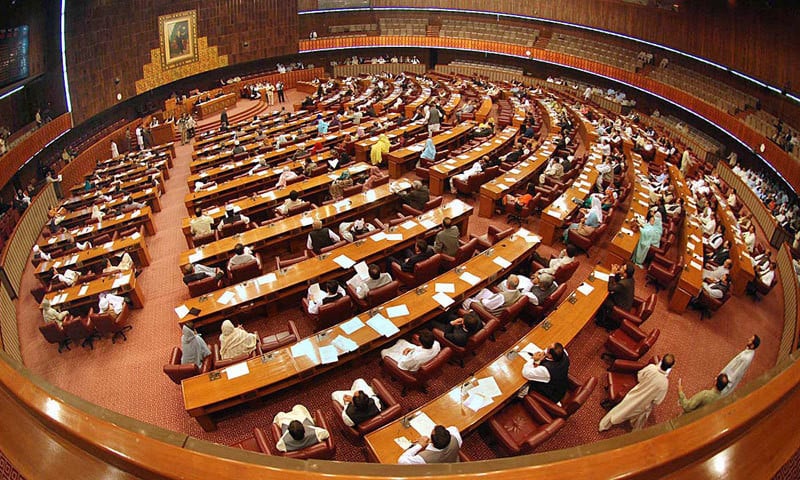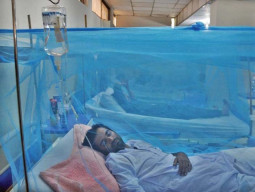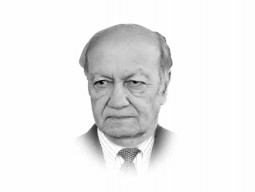
The National Assembly's special committee, tasked with hammering out proposals for the 26th constitutional amendment, has decided to zero in on judiciary-related clauses, focusing on establishing a constitutional court and the criteria for judges' appointments, it was revealed on Tuesday.
Sources privy to the discussions told The Express Tribune that while a slew of proposals has come to the table during the committee's seven meetings, the committee's main goal now is to forge consensus on the creation of a constitutional court.
All major parties, bar PTI, have already submitted their proposals.
A key point of discussion both within the meetings and among party circles has been the criteria for judges' appointments in the constitutional and other courts, with different parties proposing varied approaches.
So far, the ruling Pakistan Muslim League-Nawaz (PML-N), Pakistan Peoples Party Parliamentarians (PPPP), Jamiat-e-Ulema-e-Islam-Fazl (JUI-F), and Awami National Party (ANP) have submitted their drafts, proposing significant changes for the 26th amendment.
PML-N advocates for a federal constitutional court, while its main ally, PPPP, favours establishing constitutional courts at both the federal and provincial levels.
JUI-F has proposed creating a constitutional bench within the existing Supreme Court instead of establishing a separate court. Meanwhile, the ANP supports the government's idea of a federal constitutional court but considers the proposal for provincial constitutional courts absurd.
In contrast, PTI has remained a spectator on the sidelines, with sources indicating the party has yet to show its cards. It has neither submitted a draft nor provided any written input to the committee.
The former ruling party has yet to reveal its stance on the constitutional court or other proposed amendments.
Despite the government's focus on the upcoming Shanghai Cooperation Organisation (SCO) summit, deliberations on the constitutional amendments are proceeding swiftly.
The government is expected to make another attempt to pass the amendments before October 25 – the day the incumbent chief justice of Pakistan will hang his robes and a CJP will take charge.
"The committee is currently focusing on only two issues: the constitutional court and judges' appointments," a committee source shared, adding that other proposals might not be included in the 26th amendment bill.
The source further indicated that the government hopes to reach a consensus on these two key points, while other issues can be addressed later.
When asked if other proposals would feature in the amendment, a lawmaker responded that they could, but only after a consensus is reached on the judiciary-related changes.
Another committee member confirmed that discussions have mostly been limited to judiciary-related matters, saying that other changes could be passed through a separate constitutional amendment.
On the issue of securing enough votes, the committee member said that obtaining the necessary two-thirds majority for passing a constitutional amendment would not be difficult, as the government is likely to have opposition parties' support.
He also pointed out that the current government draft, submitted to the committee, focuses solely on judiciary-related changes, unlike earlier versions that included other proposals.
JUI-F's draft calls for the repeal of the 19th amendment, the eradication of riba (interest) at the state level, and the requirement for any bill introduced in either house of Parliament to be immediately forwarded to the Council of Islamic Ideology.
Meanwhile, ANP has proposed removing "Khyber" from the name of the province, Khyber Pakhtunkhwa.
In September, the government's first attempt to pass the constitutional amendments through hastily convened sessions of the National Assembly and Senate hit a brick wall, as JUI-F chief Maulana Fazlur Rehman refused to lend his party's eight votes in the National Assembly and five in the Senate, depriving the ruling coalition of the two-thirds majority it needed.
Since then, both PML-N and PPP leadership have been burning the midnight oil trying to bring Maulana on board, but he has yet to offer any guarantees.
On Tuesday, PPP Chairman Bilawal Bhutto Zardari held another round of talks with Maulana to iron out differences over the amendments.
Before that, Bilawal had huddled with PML-N supremo Nawaz Sharif to update him on the progress of the talks. Maulana is expected to meet Nawaz Sharif soon to thrash out a final agreement on the proposed amendments.
Meanwhile, the committee has rescheduled its next meeting, originally set for Thursday, to an urgent session on Wednesday.


















COMMENTS
Comments are moderated and generally will be posted if they are on-topic and not abusive.
For more information, please see our Comments FAQ